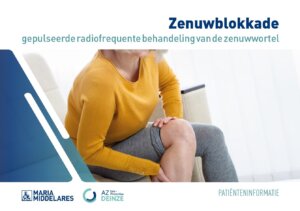Nerve block
What is it?
What is it?Due to wear and tear (arthrosis), inflammation, surgery or an accident, the spinal column may undergo changes. This can cause 'nerve pain'. Depending on which nerve is irritated, the pain will radiate to a particular part of the body, e.g. through the back of the thigh to the ankle.
A nerve block may help you in this case. With a radiofrequency current, heat is generated in the nerve that is causing you pain. This heat affects the nerve and blocks the pain signals that travel along the nerve pathways towards the brain. With the (temporary) denervation, the pain can be reduced for a longer period. The nerve is not definitively destroyed.
In order to confirm that a certain nerve contributes to your pain, a test block (e.g. diagnostic block) is first performed. A positive block is used as an indication, but is not an absolute guarantee that radiofrequency denervation will be successful.
A test block and a facet denervation cannot be performed on the same day. Denervation can be performed during the first three months after a positive test treatment.
This treatment changes the pain signals sent to the brain and can reduce the pain for a longer period of time.
Process
ProcessPreparation
Come to the hospital on the day of treatment. You do not need to be fasted for the treatment. You may eat and drink.
By law, you may not drive any vehicles or operate machinery until the morning after the treatment. Therefore, make sure that somebody can take you to and from the hospital. The physician or nurses can provide you with certificates, if required. If you wish, the nurses of the Pain Centre can order a taxi for you.
Always inform the physician if:
- you have diabetes or a heart condition
- you are (or could be) pregnant
- you are allergic to certain medication, contrast medium or iodine (disinfectant), latex, etcetera
- you take blood thinners
If you have reduced kidney function, have recently experienced thrombosis or a heart attack or have had a stent implanted, you must contact your attending physician first.
| Medication | Stop | Comments |
|---|---|---|
| Asaflow®, Aspegic® Cardioaspirin®, Aspirin® Dispirl®, Sedergin® | Stop if >500 mg/day | |
| Marcoumar®, Sintrom® Marevan® | Seven days before the procedure | Replace with injections (see Clexane, for example) Anticoagulation before the procedure |
| Ticlid® | ten days before the procedure | |
| Plavix®, Clopidogrel Brilique®, Efient® | Seven days before the procedure | |
| Xarelto®, Eliquis® Lixiana®, Pradaxa® | 48 hours before the procedure | |
| Fraxiparin®, Clexane® Fraxodi® | 24 hours before the procedure |
|
Leaflet
LeafletSee the leaflet below for more information about:
- hospital admission
- spinal cord composition
- the possible side effects and complications
Only available in Dutch:

Brochure zenuwblokkade
DownloadCost estimate
Cost estimateCentres and specialist areas
Centres and specialist areas
Something wrong or unclear on this page? Report it.
Latest publication date: 23/12/2024
Supervising author: Dr. Decaigny Veronique





